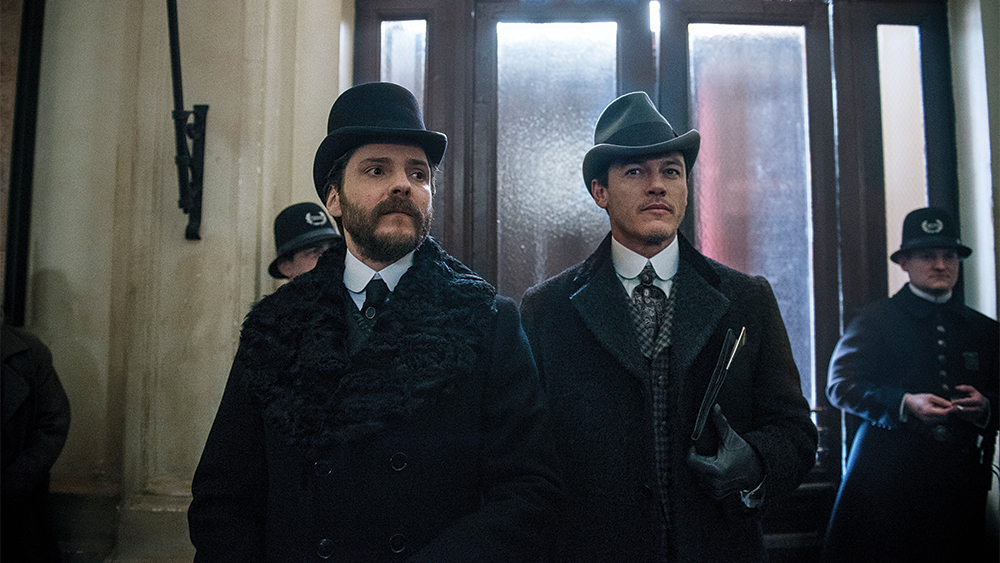The Alienist Episode 1 Review: The Boy on the Bridge
Though it may be treading familiar ground, TNT's The Alienist stands out with its strong leads and eerie atmosphere.
This The Alienist review contains spoilers.
The Alienist Episode 1
It’s hard to be original in the era of Peak TV. While network television has always been teeming with similarly structured and delivered shows about families, cops, doctors, and lawyers, cable and premium television has normally been the place for more subversive and individualistic programming. However, as every network rushes to get into the scripted original series arms race and the count of original shows on air reaches near 500, it has become difficult to produce the unfamiliar.
TNT’s The Alienist, adapted from the Caleb Carr’s hit 1994 novel of the same name, suffers from being beaten to the punch. With a glut of other shows broaching similar topics like the psychology of killing, and with the spectacle of New York period pieces on TV now becoming old hat, The Alienist conjures too many memories of other recent shows like Netflix’s Mindhunter and Cinemax’s The Knick. Hell, even Peaky Blinders and Boardwalk Empire feel closely related. The Alienist was optioned for the screen the moment it started flying off of bookshelves, and if one of those many failed attempts to bring erudite sleuth Dr. Laszlo Kreizler in front of audiences had succeeded in the ‘90s, I’m certain that it would have been greeted as a shock to the system, but in 2018 it feels like well-covered ground.
Still, just because The Alienist isn’t anything new doesn’t mean it isn’t worthwhile. Daniel Brühl goes for broke as Kreizler, imbuing him with an icy intensity while feelings of personal responsibility noticably bubble underneath the surface. As an alienist, Kreizler is essentially an early psychiatrist. The name is derived from the belief that the mentally ill and criminally insane were “alienated” from their rightful nature. Kreizler is drawn to the gruesome case of a butchered boy prostitute who was dressed as a girl at his time of death. The murder reminds Kreizler of a similar killing of a boy apparently murdered for wearing female clothing. That boy was a patient of Kreizler, a child who desired to dress like his sister. Kreizler urged the boy’s family to allow the boy to follow this impulse, and now the family holds Kreizler responsible for his death. With a new death seemingly suggesting a pattern, Kreizler makes it his mission to bring the culprit to justice.

Along for the ride are Kreizler’s longtime friend, John Moore (Luke Evans), an illustrator for the New York Times, and Sara Howard (Dakota Fanning), a no-nonsense police secretary who clearly has ambitions greater than doing paperwork for her boss, police commissioner Theodore Roosevelt (Brian Geraghty). Evans plays everyman Moore with likable charm and a clear sense of decency, but it’s Fanning who really shines. Howard refuses to take any condescension, intentional or not, from anyone and it’s clear her stern, self-serious nature is a product of dealing with the misogyny of the time. Her motivation for solving this case is just as personal as Kreizler’s, it’s just that Howard is trying to use it to prove her mettle as a detective and she notices a similar outsider status and determination in Kreizler.
Less compelling is Geraghty as Roosevelt. Maybe the caricature of the former president that’s become popular in American folklore colored my expectations too much and made me expect someone more boisterous and with more presence, but Geraghty gets steamrolled by Brühl in their scenes together. Regardless, Roosevelt’s brief interaction with Ellison and Kelly, two Mafioso types, got my attention, suggesting that one troubled child’s death could be a portal into the world of organized crime and police corruption. The combination of some strong characters and threads like this really benefit The Alienist. I found myself curious about this world and these people even divorced from a whodunit investigation.
Another point of strength is the direction from veteran TV director Jakob Verbruggen. The use of some effective, mood-setting slow motion and interesting perspective shots put you in the shoes of both Kreizler and Howard, who both seem to attract the eyes and attention of onlookers everywhere they go. The Alienist’s depiction of 19th century New York is hazy and disorienting, highlighting the economic disparity that can be seen on an ordinary street. Verbuggen’s best sequence is a foot race after a suspect that feels claustrophobic, chaotic, and thrilling in the busy avenue.
Though I immediately felt déjà vu watching yet another show about a misunderstood man of science trying to upset the stale status quo in the world of law and order, The Alienist quickly distinguishes itself with compelling characters, a rich world, and some eerie aesthetics. Brühl and Fanning are more than enough of a reason to tune in again, but I’m honestly excited to learn more about the seedy underworld that Roosevelt will look to clean up, the suspicious former captain played by consummate baddie Ted Levine, and who owns that creepy voice we heard in the episode’s final moment.
